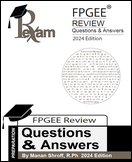
If in the pharmacist’s professional judgment oral counseling is not practicable, the pharmacist may use alternative forms of patient information. “Not practicable” includes patient variables such as:
I. the patient’s or caregiver’s hearing impairment
II. high prescription volume
III. inadequate staffing
a. I only
b. I and II only
c. II and III only
d. All
If in the pharmacist’s professional judgment oral counseling is not practicable, the pharmacist may use alternative forms of patient information. “Not practicable” includes patient variables such as:
I. the patient’s or caregiver’s hearing impairment
II. high prescription volume
III. inadequate staffing
a. I only
b. I and II only
c. II and III only
d. All
Answer: I only.
If in the pharmacist’s professional judgment oral counseling is not practicable, the pharmacist may use alternative forms of patient information. “Not practicable” refers to patient variables including, but not limited to,
a. the absence of the patient or patient’s caregiver,
b. the patient’s or caregiver’s hearing impairment, or a language barrier.
“Not practicable” does NOT include pharmacy variables such as inadequate staffing, technology failure, or high prescription volume.
Alternative forms of patient information may include written information leaflets, pictogram labels, video programs, or information generated by electronic data processing equipment.
When used in place of oral counseling, alternative forms of patient information shall advise the patient or caregiver that the pharmacist may be contacted for consultation in person at the pharmacy by toll-free telephone or collect telephone call.
A combination of oral counseling and alternative forms of counseling is encouraged.


